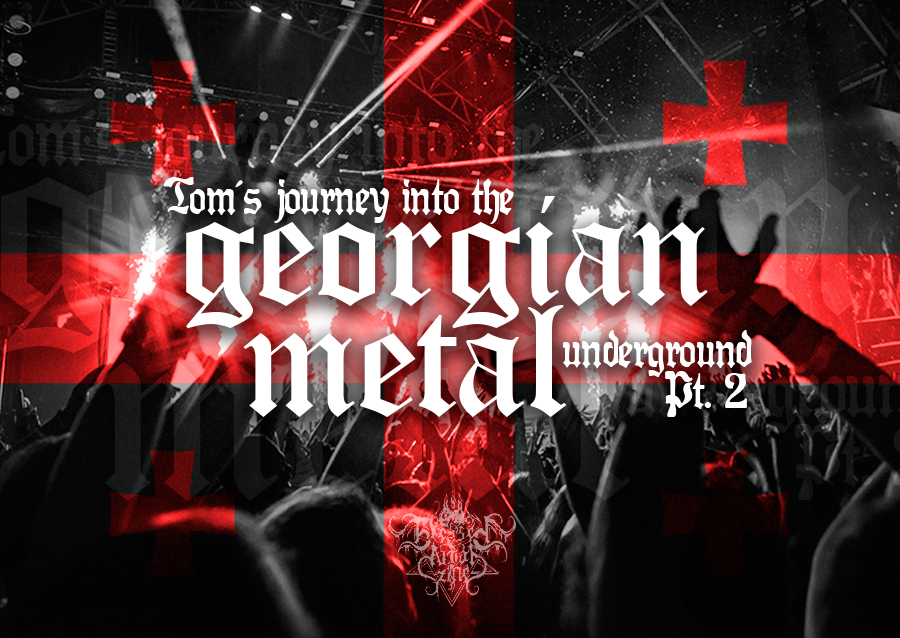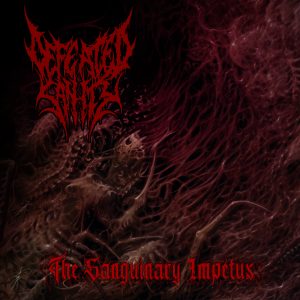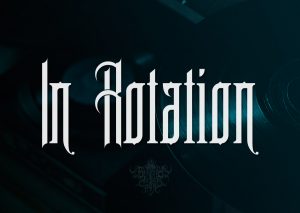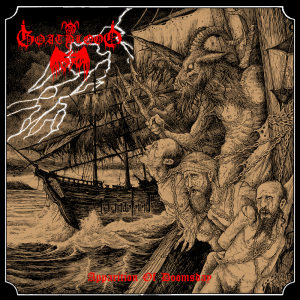Tom’s Journey Into The Georgian* Metal Underground – Part 2

(*the country, not the U.S. state)
Featuring interviews with members of ENNUI, I KILLED THE DEVIL, DIAOKHI, INFADUS, and DISMYTH
Part 2: Georgian Society and Making Metal Music
In the first part, we met some of the musicians and read about their experiences growing up in Georgia (if you haven’t read part 1 yet, you can here). It’s time now to find out more about Georgian society. Is Tbilisi a friendly environment for people wanting to make Metal music? What kind of Metal community is there? What are some of the challenges that musicians face if they choose to go down these musical paths? But before answering these questions there was something else I wanted to know…
Religion:
Perhaps more than with any other genre of music, there has always been tension between Metal communities and religious societies. Being full of evocative imagery and powerful symbols, religions can be great well to tap inspiration from. Often musicians will be exploring complicated ideas and questions about religion, belief, the nature of existence; in some cases the attraction may be more superficial, perhaps just an interest in dark imagery; sometimes bands just want to shock and get a reaction. It all has its place.
But what about for those outsides of this musical culture? What if Rock music alone seemed abrasive and immoral? If Elvis Presley, AC/DC, or ZZ Top seemed like an ominous foreshadowing of the decline of young hearts and minds; pied pipers leading the youth astray, it wouldn’t take a great leap of the imagination to see that even without direct reference to pagan or satanic elements, harsh vocal styles typical in subgenres like Black or Death or Sludge Metal, alongside abrasive guitar tones and pounding percussion could really seem demonic and well… scary.

So how significant has the religious aspect of Georgian society been for our musicians and what impact has it had on their lives?
Catherine Polak (Diaokhi): “Georgia is, was and probably will be a very religious country. You can’t walk 100 meters without bumping into an old or a newly built church of some kind. Probably some people truly believe and hopefully, live and act according to their beliefs but a huge part of it is just bigotry, ritualism and a means to preserve a somewhat archaic order of living. But religion was always very important in Georgia. My philosophy is simple “live and let live”. I don’t care what your beliefs are, as long as you don’t try to convert me we’ll be good. Unfortunately, it never worked the other way around. To the point that if you are an Atheist in Georgia you better keep quiet about it. Recently it got so bad, that some religious activists even canceled Tiamat’s concert in Georgia by protesting and marching to the venue baring crosses and stuff.”

David Unsaved (Ennui): “Historically, Georgia has always been a religious country. Orthodox Christianity is an important part of Georgian traditional culture and identity, although, in the XX century it kind of died out thanks to Stalin and Communism. So, when we were young, Georgia was a secular country until after the fall of Communism when religion became fashionable again. And suddenly, everyone was Christian, to the degree that being a non-believer was seen as an unpatriotic thing. I think, it’s annoying and fake. Personally, I have a negative attitude towards any organized religion, since in many ways it prevents society from developing and struggling with prejudices, stupid fears, ignorance and superstitions. In addition, I am outraged by the hypocrisy and corruption in the Church. I am a completely irreligious and unbelieving person. However, as an adequate person, I certainly respect the right of other people to believe in anything they want. Until it somehow touches me personally.”
Gio Xurcilava (Infadus): “Well, Orthodox Christianity actually occupies 80% of Georgian society. Back in the 90s and early 2000s it was pretty risky to perform metal music, because people would judge you , accuse you of Satanism and in many cases people would beat you up in the streets at night. Hopefully those times have passed. But even in modern Georgian reality – religion is a huge wall which blocks the Metal industry and scene. In 2016 Infadus had a live performance at Wacken Metal battle Caucasus. Lots of popular bands were to play at that concert. Such as Jinjer, Tiamat, Walkways and so on… It was a big deal for us, so we put a lot of effort into preparing for that concert, but when the day finally came, several Christian priests, along with their army of followers ( about 100-200 people ) attacked the festival. They threatened to beat us up and burn down the equipment if we did not stop the show. We did not, so they actually cut the wires and the organizers had to cancel the concert. we were furious and don’t get me wrong because I myself am a Christian, which has nothing to do with the music we write and perform and so the show must go. On the next day, the concert took place in another area, which was like a basement, way worse than the original scene. So eventually we were invited on a famous Georgian talk show and discussed the issue peacefully. But still the damage was done.”

Jan Staubach (Dismyth): “I arrived in Georgia two years ago. Even from the very beginning I noticed the strong role of the Georgian Orthodox church in everyday life. You can find a lot of monasteries and see that belief is an important part of most Georgians’ identity. For me, as a foreigner, it is really interesting to experience such a presence. I like the atmosphere that surrounds the monasteries, although I am not directly a part of the community. A lot of non-metal heads do not understand why someone should listen to this type of music, and generally Metal does not receive a lot of attention or appreciation in Georgian society. As I know from Germany when I was younger, black clothes and Metal music are quickly connected to depression or even Satanism. Events like Redrum or the Wacken Metal Battle try to overcome this situation.
Luka Daniela (Dismyth): “Georgia became a Christian country in the 4th century and from that time religion has had a very big role in people’s life. Here maybe you can hear from someone that it’s a sin to listen to Heavy music, but of course it’s not right. I am a religious person, I am serving at church, and this is not a contradiction for me. I think the message comes from the lyrics, but not from the melody. Melody can transport a certain mood, but it cannot transport a statement – supporting or opposing religion. Still, for many Georgians, Metal music and Christian belief cannot go together. The Doom Metal band Trouble serves as a good example combining sinister sounds with Christian lyrics.”
Holly Mad (I Killed The Devil): “Religion for Georgian people always was and still is one of the key factors that saved our nation, throughout our path of history that counts millenia. For me God always was and will be something different not like some almighty Oldman, sitting no one knows where and controlling everything and everyone. I think a lot about that topic, yet I haven’t got answers to my questions and I think I will never have. For me, there is one Golden rule “Treat others like you want to be treated”.”

The Metal Community:
It would seem then that anyone choosing to make Metal music in Georgia feels the influence of Christianity around them, whether directly or indirectly. But what about society in general? Do radio stations play Metal? Is there a community of Metal fans who help to keep the interest in Metal alive? And do musicians feel a kinship, like they are all part of a “scene” together?
Catherine (Diaokhi): “I don’t really know [how big Metal is in Georgia]. I have not lived in Georgia for almost a decade. They still played some bands like Rammstein or Korn back in the 2000s and I think nowadays there are a lot more people listening to metal in Georgia, but most radio stations are predominantly playing same extremely cheap local and Russian Pop “music”, which is beyond me.”
 David (Ennui) “Unfortunately, Georgia itself is not a mentally Metal country. Compared to other European countries, there is a critically low interest in this genre here, although it has its own small scene and audience. Metal festivals are quite rare. Today, Georgia has a more well-developed culture of Electronic music than Metal music. It is hard to say why it happened that way. Maybe at one time Georgia was very isolated from modern subcultural trends, and the spirit of Heavy Metal music was not too deeply settled in people’s minds.”
David (Ennui) “Unfortunately, Georgia itself is not a mentally Metal country. Compared to other European countries, there is a critically low interest in this genre here, although it has its own small scene and audience. Metal festivals are quite rare. Today, Georgia has a more well-developed culture of Electronic music than Metal music. It is hard to say why it happened that way. Maybe at one time Georgia was very isolated from modern subcultural trends, and the spirit of Heavy Metal music was not too deeply settled in people’s minds.”
“As I said above, Georgia has its own small scene with different genres. And due to the scale of the local Metal scene, all the musicians, of course, are friends with each other. It often happens that completely different groups have the same musicians, or one musician plays in several different groups at once. Especially drummers. They are generally a canopy of gold. Very rarely you can meet a good extreme drummer here, and if there is one – then a lot of bands call him to play with them. So yes, the Georgian local Metal scene is built on crossover and collaborations of different musicians.“
Gio (Infadus): “We don’t actually have a radio station to play metal music in Georgia. It is not a very popular thing to be honest. But we have some quite motivated fans and audiences who will break their necks just to be part of the Metal scene and community and they really do put the soul in Georgian Metal music writing. If not them, we wouldn’t be so encouraged to keep on doing what we love. Big thanks to all of them who regularly come to our shows and support us.”

“The Metal scene in Georgia is pretty narrow. We don’t have many bands who make Metal music. But we have some very original ones such as Psychonaut 4. We are really good friends. And generally every Metal band knows each other in Georgia. We always support each other and provide help as much as we can. But since the budget for the Metal scene is very low, we can’t afford lots of collaborations, though we would love to.”
Jan (Dismyth): “The Metal scene in Georgia is rather small as Electronic music is the most popular of the modern genres. There are only a handful of bars and events with Metal music. This results in a small but interconnected community of bands and fans of Metal music. Usually bands know and support each other wherever they can.”

Luka (Dismyth): “We have great Metal bands in Tbilisi. Mostly concerts are held in underground scenes, not expensive to attend. And mostly bands are organizing concerts together. Everyone knows each other.”
Nika (Dismyth): “Heavy Metal in Georgia is some kind of underground music, but you still can find its “worshipers”, which is nice. But mostly people do not understand it.”
Holly (I Killed The Devil): “It’s hard to say how big Metal in Georgia is, we are a small nation and for sure there are not too many metalheads but still it’s not a small amount of people. We have our little history which is not well known even for most native metalheads, but it begins from early periods like in Europe and the US from the 60s. But independently, from the second half of the 80s, there were a few Metal bands who were playing heavy metal in Georgia and from the early 90s the first Thrash and Death Metal bands appeared, and it still continues to progress and follow the modern flow. There is no radio station you could bring your records to, or even just to listen to while you drive your car to work.”

“The Metal scene now is in a strange condition. Once or twice there might come some popular bands from abroad, and a few shows of the local bands. It’s hard to find good venues for the shows. There are 1 or 2, but they are too big and it costs a lot. In case you do find any bars where you can play, the stage is too small and there is not enough space, so at the moment we struggle with that. And yet there are really good bands with great music and with good perspectives, but it’s very very hard for us to reach the ones to whom we could work on further development. Of course there are a lot of crossovers through different band members, mostly we are friends. In every band we can find at least one of our close friends, so that happens very often.”
The Economics of Metal:
Much has been written over the years about the constant struggles of musicians to earn a living from their music. Whether it’s internationally famous artists on major record labels, or musicians at the more DIY end of the spectrum, the formula for fame and wealth, sadly, has never been a simple 1:1 ratio. Some of my favourite bands like SWANS or OXBOW or NEUROSIS or TODAY IS THE DAY probably wouldn’t be known to the average casual music listener. They don’t write “hits” for the radio, but within the right musical circles these are influential and very well respected bands. And yet, I know that none of the above mentioned bands make what you could call a comfortable living from their music.
It’s a struggle to follow a singular artistic path and be financially rewarded for doing so. And yes, all of the bands I listed above are from the US, which puts them at least in the biggest economic market, even if what they are creating has marginal appeal. So how is it then if we take a far smaller country, a smaller economy, a more difficult environment to get one’s music out to a wider audience? What is the financial side of making music like for our musicians making Underground Metal music in Georgia? Have they been able to make a living from their music?
Catherine (Diaokhi): “Not at all. Everything we did was based on pure enthusiasm. And honestly, we never thought about music being more than a way of expressing ourselves. I personally really enjoyed the creative opportunities it opened for me. All the Makeup (aka “corpsepainting”), costumed photo sessions, cover arts etc.
David (Ennui): “The financial part is usually the most difficult. Given the current economic crisis in Georgia, the level of local currency is several times lower than the European one. This is a big problem when it comes to production and recording of an album. Of course, we are trying to bring most of it to the ideal level on our own, but the result requires the skills of professional sound engineers. Usually we lose money when we turn to the services of foreign studios. Sometimes labels are partially helping us with solving these problems, but only partially and very rarely. We still put in most of the money out of our own pockets and never count on any profit. Then the question is: why are we doing this? Nevertheless, the answer is always simple – we just make music for the music itself. However, I think that personally, our problem with profit is because we seldom do live shows. I sincerely hope that in the future we will do more shows.”
Gio (Infadus): “Practically there is no business interest in the Metal scene in Georgia. So we dont make money at all. Everything we do comes from our own pockets, our love and passion for music and fans out there.”

Luka (Dismyth): “There is not a lot of money in the Georgian Metal scene. One major reason for organizing joint concerts is for supporting bands in financing tours, recording their music, etc. Even the more popular among the Georgian Metal bands, e.g. Psychonaut 4 or Every Dog Has Its Day, cannot afford a living from making music. Therefore, the community of bands and fans is really important to keep the scene alive. Everyone who is creating Metal music, has his/her separate profession. I (Luka) am working as an IT engineer at the University, Jan is a forestry advisor in development cooperation. I (NIka) co-own a company which does furniture design and furniture itself, and I do it myself too. Now I (Nino) work as an alcohol guide, but I change my job very often, sometimes I’m a bartender, sometimes I’m a waitress, sometimes I’m a musician with my cover band in the bars and also I’m a piercing maker too.”
Holly (I Killed The Devil): “You might somehow get 1 or 2 shows in a year where you might get paid but it’s impossible to make a living with metal music. For that you should tour outside of Georgia, in Europe or the US and to arrange that from here is very very hard.”
And that’s where we’ll leave the story for now. In the next and final installment we’ll turn to the music itself: how hard it is and was to keep these bands together, song-writing processes and what impact our musicians want or wanted their music to have on their audiences.
Thanks again to all the contributors. If you would like to follow any of them, check out the links below. I hope you’ll join us again for the final installment next week.
Dismyth
Bandcamp
Facebook
YouTube
I Killed The Devil
Facebook
Tom Boatman
**Please support the underground! It’s vital to the future of our genre.
#WeAreBlessedAltarZine
#TheZineSupportingTheUnderground


